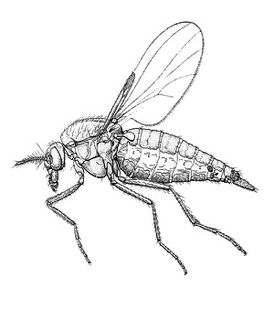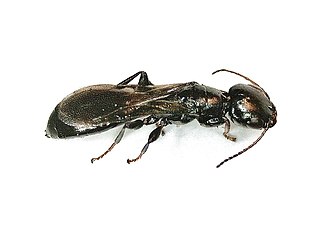
Ceratopogonidae is a family of flies commonly known as no-see-ums, or biting midges, generally 1–3 mm in length. The family includes more than 5,000 species, distributed worldwide, apart from the Antarctic and the Arctic.

Psychodidae, called drain flies, sink flies, filter flies, sewer flies, or sewer gnats, is a family of true flies. Some genera have short, hairy bodies and wings giving them a "furry" moth-like appearance, hence one of their common names, moth flies. Members of the sub-family Phlebotominae which are hematophagous may be called sand flies in some countries, although this term is also used for other unrelated flies.

The Chironomidae comprise a family of nematoceran flies with a global distribution. They are closely related to the Ceratopogonidae, Simuliidae, and Thaumaleidae. Many species superficially resemble mosquitoes, but they lack the wing scales and elongated mouthparts of the Culicidae. An example of mosquito-resembling species is Tokunagayusurika akamusi.
Sphaeropsocidae is a family of Psocodea, belonging to the suborder Troctomorpha. Females of this family have reduced, beetle-like elytra, and lack hindwings, with males have either small or absent wings. The family comprises 22 known species in eight genera.

Atelestidae is a family of flies in the superfamily Empidoidea. The four genera were placed in a separate family in 1983; they were formerly either in Platypezidae or considered incertae sedis. While they are doubtless the most basal of the living Empidoidea, the monophyly of the family is not fully proven. The genus Nemedina seems to represent a most ancient lineage among the entire superfamily, while Meghyperus is probably not monophyletic in its present delimitation, and it is liable to be split up eventually, with some species being placed elsewhere. In 2010, the genus Alavesia, previously only known from Cretaceous fossils, was found alive in Namibia, subsequent species were also described from Brazil.

Cricotopus is a genus of non-biting midges in the subfamily Orthocladiinae of the bloodworm family Chironomidae.

Metriocnemus is a genus of non-biting midges in the subfamily Orthocladiinae of the bloodworm family Chironomidae.

Chironomini is a tribe of midges in the non-biting midge family (Chironomidae).

Polypedilum is a genus of non-biting midges in the subfamily Chironominae of the bloodworm family Chironomidae. This is probably the most species-rich of all chironomid genera. Larvae of Polypedilum may also be among the most abundant invertebrates in euthrophic ponds, reaching densities of up to 1200 larvae per square meter.
Cladopelma is a genus of non-biting midges in the subfamily Chironominae and tribe Chironomini of the bloodworm family Chironomidae. Species are distributed world-wide, with species represented in the Palaearctic, Nearctic, Neotropical, Afrotropical, Sino-Indian, and Austroasian regions.

Tanytarsini is a tribe of midges in the non-biting midge family (Chironomidae).
Buchonomyia is the only extant genus of the subfamily Buchonomyiinae of the non-biting midge family Chironomidae. There are three known extant species and one fossil species in the genus: Members of the genus are parasitic of psychomyiid caddisflies.
Monodiamesa is a genus of midges in the non-biting midge family (Chironomidae).
Odontomesa is a genus of midges in the non-biting midge family (Chironomidae).
Diamesini is a tribe of midges in the non-biting midge family (Chironomidae).

Leptoconops is a midge genus in the family Ceratopogonidae. It has a mostly tropical or subtropical distribution worldwide, but some species occur as far north as Moscow region in Russia and the Yukon Territory in Canada.

The Bethylidae are a family of aculeate wasps in the superfamily Chrysidoidea. As a family, their biology ranges between parasitoid wasps and hunting wasps.
The Scolebythidae are a small family of aculeate wasps in the superfamily Chrysidoidea. These chrysidoid wasps are found in Africa, Australia, the Neotropics, north China, Thailand and Fiji. They are parasites on larvae of Cerambycidae and Ptinidae.

Winnertziinae is a subfamily of gall midges and wood midges in the family Cecidomyiidae.
Porricondylinae is a subfamily of gall midges and wood midges in the family Cecidomyiidae.











